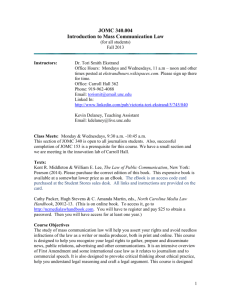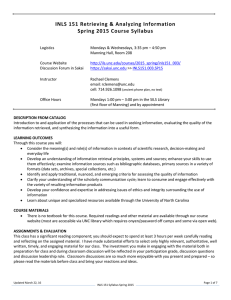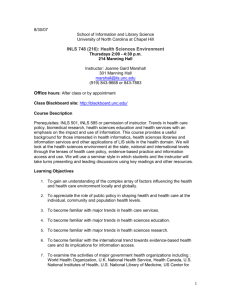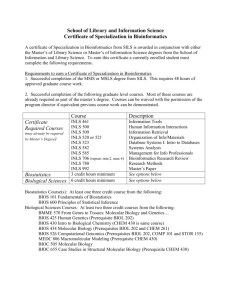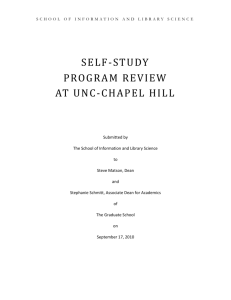Syllabus - UNC School of Information and Library Science
advertisement
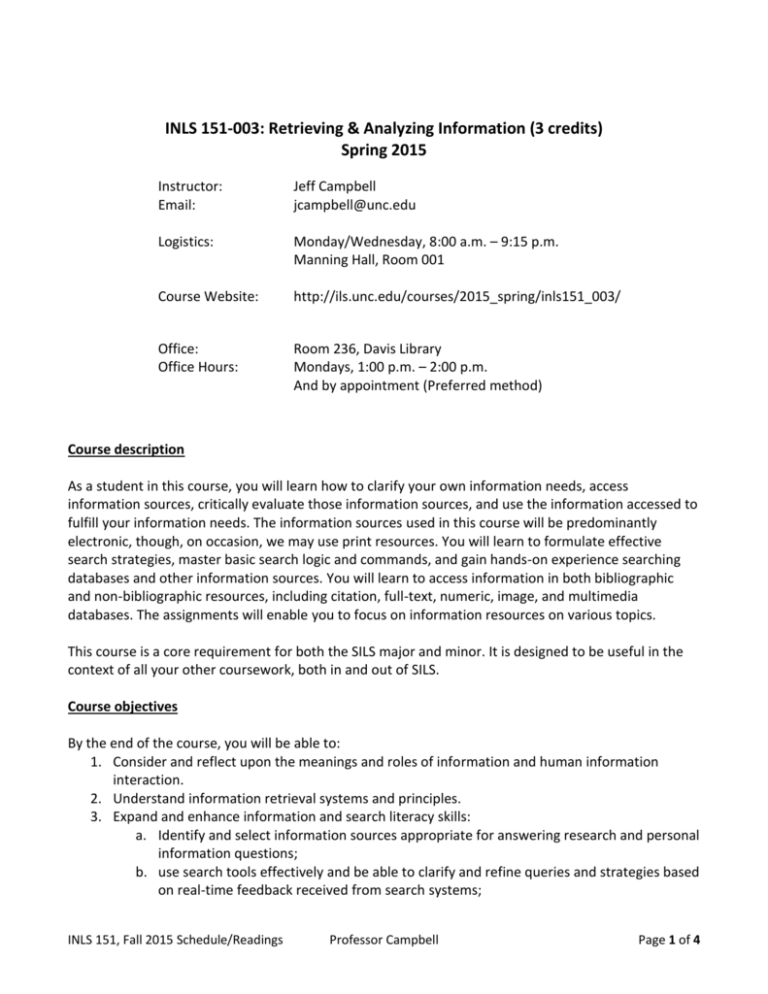
INLS 151-003: Retrieving & Analyzing Information (3 credits) Spring 2015 Instructor: Email: Jeff Campbell jcampbell@unc.edu Logistics: Monday/Wednesday, 8:00 a.m. – 9:15 p.m. Manning Hall, Room 001 Course Website: http://ils.unc.edu/courses/2015_spring/inls151_003/ Office: Office Hours: Room 236, Davis Library Mondays, 1:00 p.m. – 2:00 p.m. And by appointment (Preferred method) Course description As a student in this course, you will learn how to clarify your own information needs, access information sources, critically evaluate those information sources, and use the information accessed to fulfill your information needs. The information sources used in this course will be predominantly electronic, though, on occasion, we may use print resources. You will learn to formulate effective search strategies, master basic search logic and commands, and gain hands-on experience searching databases and other information sources. You will learn to access information in both bibliographic and non-bibliographic resources, including citation, full-text, numeric, image, and multimedia databases. The assignments will enable you to focus on information resources on various topics. This course is a core requirement for both the SILS major and minor. It is designed to be useful in the context of all your other coursework, both in and out of SILS. Course objectives By the end of the course, you will be able to: 1. Consider and reflect upon the meanings and roles of information and human information interaction. 2. Understand information retrieval systems and principles. 3. Expand and enhance information and search literacy skills: a. Identify and select information sources appropriate for answering research and personal information questions; b. use search tools effectively and be able to clarify and refine queries and strategies based on real-time feedback received from search systems; INLS 151, Fall 2015 Schedule/Readings Professor Campbell Page 1 of 4 c. critically evaluate information resources for quality, accuracy, and authority; and d. analyze and incorporate new information in response to your original information need. 4. Synthesize and articulate results into forms that others with similar information needs can use as a resource. 5. Learn about and understand issues of ethics and integrity surrounding the use of information Course grades All grades are in accord with UNC University policy*: A - Mastery of course content at the highest level of attainment that can reasonably be expected of students at a given stage of development. The A grade states clearly that the student has shown such outstanding promise in the aspect of the discipline under study that he or she may be strongly encouraged to continue. B - Strong performance demonstrating a high level of attainment for a student at a given stage of development. The B grade states that the student has shown solid promise in the aspect of the discipline under study. C - A totally acceptable performance demonstrating an adequate level of attainment for a student at a given stage of development. The C grade states that, while not yet showing any unusual promise, the student may continue to study in the discipline with reasonable hope of intellectual development. D - A marginal performance in the required exercises demonstrating a minimal passing level of attainment for a student at a given stage of development. The D grade states that the student has given no evidence of prospective growth in the discipline; an accumulation of D grades should be taken to mean that the student would be well advised not to continue in the academic field. F - For whatever reasons, an unacceptable performance. The F grade indicates that the student's performance in the required exercises has revealed almost no understanding of the course content. A grade of F should warrant an adviser's questioning whether the student may suitably register for further study in the discipline before remedial work is undertaken. *These definitions are from: http://www.unc.edu/faculty/faccoun/reports/2000-01/R2001GradingStandardsAddendum.htm INLS 151, Fall 2015 Schedule/Readings Professor Campbell Page 2 of 4 The total grade will be based on the following components: Component When Graded Description % of Final Grade We will be reading a variety of works and watching several videos in support of the diverse topics we will discuss in class. You are responsible for reading/viewing all of these. Your participation in class is critical to the success of this class. Contributing your ideas, reactions and questions to the topic will nurture you skills and comfort at presenting your thoughts orally. We all benefit from dialogue that includes diverse and even occasionally conflicting perceptions. Plan to attend class and arrive on time. You will be penalized for excessive absences and tardiness. Be courteous to your classmates and course instructor by not conversing with others during class lectures. Turn off cell phones, pagers, and other devices that might disrupt class. Use laptops and other In-class devices to support current course activities only. During the 1 participation hour and 15 minutes you are in class, your attention should be completely devoted to the course. Each class 10% When given 10% Your participation grade is based on my perception of your participation in and out of class. Class participation consists of doing the following: attending class, arriving to class on time, being prepared for class, making observations about the readings, asking questions, taking notes, actively working on in-class exercises and actively listening. If an unexpected problem arises for you during the course of the semester (serious illness, etc.), please let me know immediately so that we can discuss an appropriate schedule for you. If you need to miss class because of a religious holiday, then we can make alternative arrangements for this as well. Quizzes Throughout the course of the semester, pop quizzes will be administered at the start of class. Quiz questions will be about the day's readings. Quizzes cannot be made-up for any reason. If you arrive late to class and the quiz is still 'in session' then you can start the quiz. However, you will not receive extra time to complete it. Your quiz will be collected along with everyone else's. INLS 151, Fall 2015 Schedule/Readings Professor Campbell Page 3 of 4 When assigned When assigned Homework Mid-term exam Annotated Bibliography Project Group Project Final exam This will either be a test or a special assignment. Project description and instructions will be discussed in classes and will be available on Sakai. Each project will be worth 20% of your total grade. The Final Exam is scheduled for TBA. I expect you to be there. If you do not attend you will receive an F, no questions. If you anticipate some problem with taking the exam on this day, then you need to let me know at least 2 weeks in advance. You will need to provide documentation of why you cannot take the exam during the regularly scheduled period. INLS 151, Fall 2015 Schedule/Readings Professor Campbell 10% 10% In parts 40% TBA 20% Page 4 of 4
